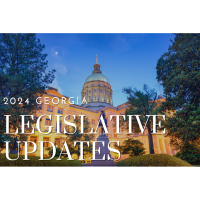While there will be plenty of other measures for members to consider this session, passing a balanced budget is the only constitutionally required action item for the General Assembly each year. Governor Kemp, who released his AFY24 and FY25 budget recommendations last week following his State of the State address, kicked the hearings off Tuesday morning by highlighting several of his budget recommendations, including:
For the next three days, dozens of state agency heads presented their budget asks to the Appropriations Committees and were on hand to answer questions from legislators. Next week, Appropriations subcommittees will begin to meet to do a deeper dive into each portion of the budget.
On Tuesday, Speaker Jon Burns (R-Newington) and Speaker Pro Tempore Jan Jones (R-Milton) held a press conference to announce recommendations for significant investments in Pre-K education to expand access and increase teacher pay. Their recommendations include reducing maximum class size from 22 to 20, increasing salaries for lead and assistant teachers, increasing the start-up funding for materials and furnishings to open a classroom, and providing funding for the capital costs associated with opening new or renovated Pre-K classrooms in public schools. These recommendations come from the report developed by the House Working Group on Early Childhood Education.
Also this week, Lieutenant Governor Burt Jones and Senator Randy Robertson (R-Cataula) announced the introduction of Senate Bill 355, which would ban ranked-choice voting in Georgia, which the lieutenant governor said is “designed to cause confusion and fatigue among voters.” Senator Roberston, who will be carrying the bill, said the legislation is to continue to build on the work done “with Senate Bill 202 (2021) of being proactive in ensuring Georgians can trust their elections and trust that their vote will be counted.” When the Senate reconvenes on Monday, the bill will be first read and assigned to committee.
This weekly Legislative Update report is courtesy of the Regional Business Coalition of Metropolitan Atlanta (RBC), an organization of over a dozen of the largest and most active Chambers of Commerce throughout the metro Atlanta region. RBC member chambers represent over 15,000 member companies who employ millions of metro Atlanta residents. The RBC’s primary goal is to represent the interests of RBC Chamber members on regional public policy issues impacting our transportation, water and air quality and to advocate for solutions that improve metro Atlanta’s quality of life and economic vitality.
DeKalb Chamber of Commerce
Frankie Atwater President & CEO
After the MLK holiday, legislators were back under the Gold Dome this week for joint Appropriations Committee budget hearings. Led by Senate Appropriations Chairman Blake Tillery (R-Vidalia) and House Appropriations Chairman Matt Hatchett (R-Dublin), members of the two committees gathered for three full days of meetings Tuesday through Thursday to hear from leaders of the dozens of state agencies about their budget requests for Amended Fiscal Year 2024 and Fiscal Year 2025.
After Governor Kemp’s remarks, state economist Robert Buschman presented to Appropriations Committee members. He told committee members that, since Fiscal Year 2018, state revenue has grown cumulatively by $10.4 billion, and noted that 91 percent of that growth can be attributed Fiscal Years 2021 and 2022. He discussed economic trends and noted that he anticipated a mild recession would be likely later in the year.
Although the legislature did not convene this week, leaders of both chambers announced new legislative priorities for this session—
The General Assembly will convene Monday through Friday next week for Legislative Days 6 through 10. Committee action will likely pick up considerably next week as committees begin to consider some of the many measures that are still in play from the 2023 legislative session. We also anticipate a significant number of bills to be introduced in the coming weeks with the February 29th Crossover Day deadline looming. Also quickly approaching is qualifying— all legislators wishing to seek reelection (and their non-incumbent challengers) must qualify to do so at the Capitol between March 4th and 8th.


